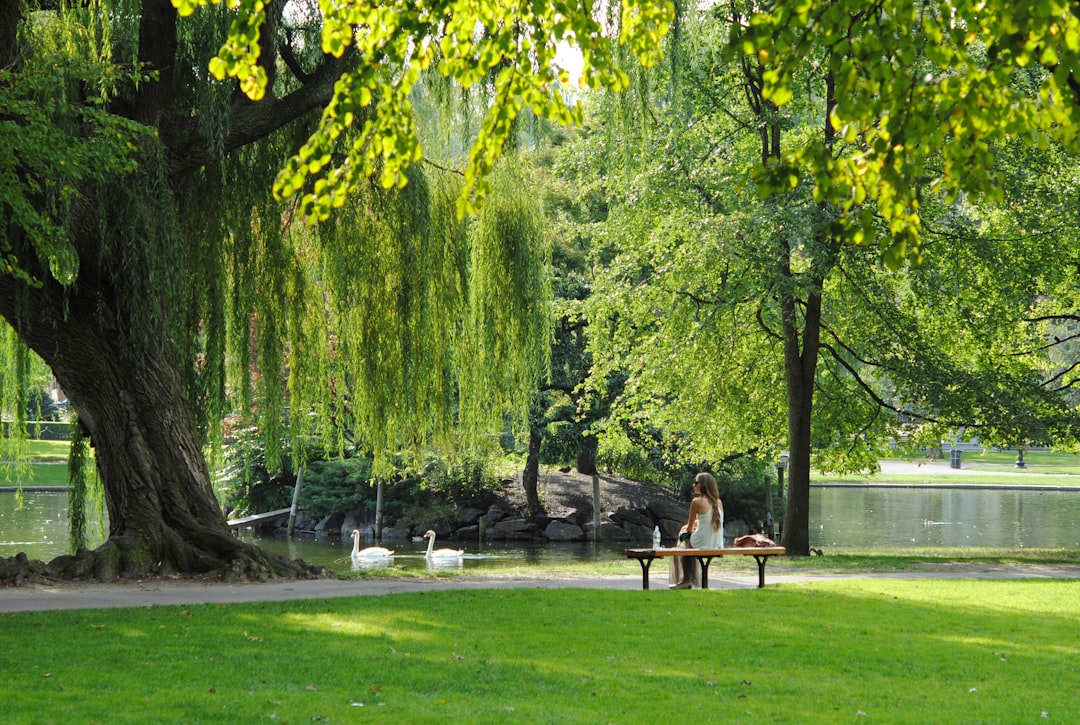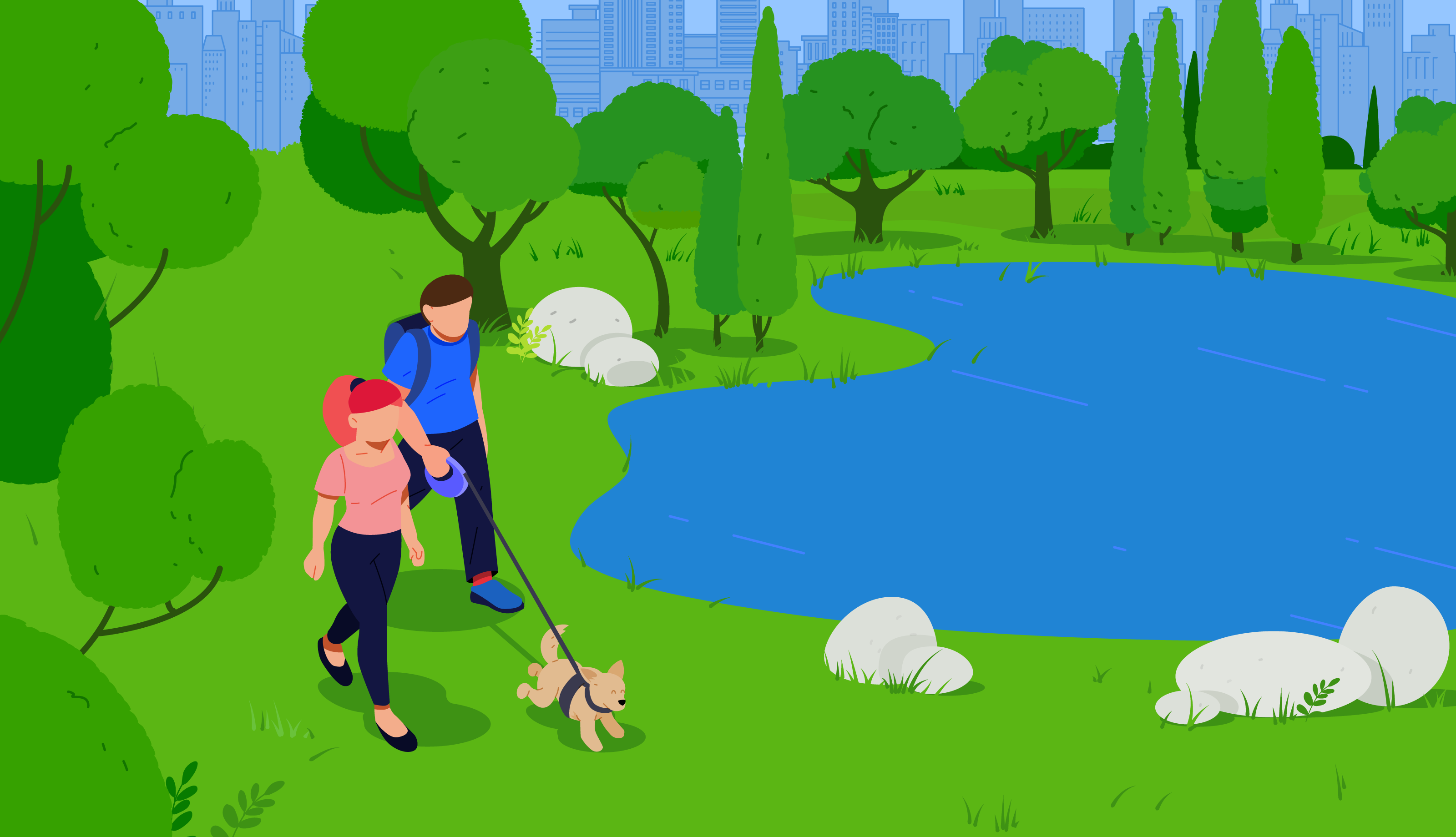You might be on lockdown, but you’re allowed to get out once a day. Don’t miss out on this opportunity to boost your health with nature and green spaces!
All over the world, countries and governments are telling the citizens to stay at home to slow the spread of the COVID-19 virus. But at the same time in the UK (and other countries), citizens are allowed one outdoor exercise per day, such as running or having a stroll in a park either alone or in groups of two.
Table of contents
- Antidote for stress
- Alzheimer’s and dementia
- Heart health
- Stroke recovery
- Depression and anxiety
- Cognitive function
- Wellbeing and mood
- Asthma and respiratory problems
- Overall health and longevity
- Immune system function
- ADHD in children
- Children’s development
- Mental health and memory
- Better sleep for better health
- Preventing and managing diabetes
So, even though you are to stay at home at all costs, you are still allowed to go outside once per day. Why is the government encouraging people to break their isolation on a daily basis? Medical research has the answer: many studies point to the benefits of nature and fresh air for your health and peace of mind.
| Green spaces near you | ||
|---|---|---|
| Local parks | Commons | National parks |
| Urban Farms | Gardens | Forest trails |
There are plenty of green areas in the UK. You might even find a luscious park close to your home if you take a moment to look out of your window. If you need some convincing, here are 15 unique reasons to step outside the door and enjoy nature as spring is, finally, approaching.
☝️IMPORTANT☝️Government guidelines change quickly in response to the pandemic. Check your national health guidelines before heading out.
1. Antidote for Stress
Green areas can reduce cortisol levels. This stress hormone can be helpful is important, but too much of it for too long can be bad for you.

Spending time in nature and access to green spaces has shown to have a positive impact on stress levels and can also reduce cortisol, a stress hormone, in your blood throughout the day. This positive effect happens in everyone, regardless of gender, age, and socioeconomic background.
This is all good and well if you have a job where you spend most of your days outside. But what about those who (used to) spend their days in an office, be it in the city or at home? Even access to a window with a view of trees and green areas can lower work-related stress and increase job satisfaction.
2. Helping with Alzheimer’s and Dementia
Horticultural therapy uses gardening and nature to help people with neurodegenerative illnesses like Alzheimer’s, dementia, and Parkinson’s.
Living in close proximity to a road is shown to increase the risk of developing Alzheimer’s, dementia, Multiple Sclerosis, and Parkinson’s. While you might not be able to change that, the same research indicates that having green spaces close to your home may help lower your risk of developing these conditions.
3. Promoting Heart Health
Gardening helps recover from cardiac disease or heart surgery by reduce stress, which can have a negative impact on blood pressure.

Coronary heart disease is one of the world’s biggest killers: every year many people are diagnosed with heart disease and undergo surgery, resulting in physical and mental distress. Therapeutic gardening has been shown to reduce stress, which is bad for the recovering heart.
Many studies show how working with nature might help people in their recovery. One study by the New York University School of Medicine found that horticultural therapy can reduce stress and anxiety, and can be used to support the rehabilitation of patients suffering from coronary artery disease.
☝️TIP☝️Discover what to eat and how to stay healthy from within with the Atlas Microbiome Test.
4. Supporting Stroke Recovery
Stroke patients living close to green spaces have a higher chance of survival, and regular outdoor walks support recovery after a stroke.
Stroke is yet another main cause of death for many people. Regular exercise and a healthy lifestyle is widely accepted as a way to reduce the risk of getting this life-threatening condition.
Regular outdoor brisk walks have also been shown to help stroke survivors recover. Research indicates that people recovering after a stroke who live in proximity of a green area have a higher chance of survival.
5. Reducing Depression and Anxiety
Living close to green areas helps reduce feelings of anxiety in teens and adults, and going for a walk in nature can help people diagnosed with depression.
People diagnosed with depression can also benefit from nature. One study by Michigan University showed that patients diagnosed with Major Depressive Disorder experienced an improvement in memory and mood after walking in nature.
6. Improving Cognition
Your brain does a lot of work and it needs to recover from this effort. Spending time in nature gives this organ the break it needs to improve your cognitive functions.
One study by the University of Michigan shows that walking in nature, or just looking at pictures of nature, can help your brain recoup and improve your direct-attention abilities that help you stay focused on one task when there are other distracting things around you.
In 2016, a group of researchers in Spain conducted a systematic review of studies looking at the association between green spaces and cognition. Their results confirmed that the presence of green spaces in cities helps improve cognitive function and also supports cognitive development in children.
7. Boosting Wellbeing
A person’s sense of wellbeing can be enhanced by spending several hours per week in nature, and when it is close to our home.
There are many reasons why exercising is good for our body and mind. Doing exercise in nature, such as walking and running, can improve mood and self-esteem, which is important for mental and physical health. But how much time are we supposed to spend in nature to feel these effects?

One study made in the UK spanning over several years suggests that both health and wellbeing can grow if we spend at least two hours per week outdoors. Living close to green areas in cities has also been proven to make humans feel better.
8. Alleviating Asthma and Respiratory Problems
Vegetation in all forms helps improve air quality. For people with asthma and other respiratory symptoms, this is very important.
We all rely on good air quality for a healthy life. Vegetation has been linked to improved air quality both in our home and in cities. For people suffering from asthma and other respiratory symptoms, cleaner air helps alleviate symptoms and results in less hospitalisations.
Similar results have been found in children. A study made in Spain showed that cold, wet places with more green areas had fewer cases of wheezing in children. Living in a hotter and drier climate has also been shown to reduce the risk of bronchitis, a common chest infection.
9. Supporting Overall Health and Longevity
Living close to green areas you can walk in can support overall health and longevity, which is particularly important for later years.
Many have looked to the Japanese for answers because they tend to live longer and healthier lives. One suggested answer is the amount of time the Japanese spend outdoors. A study conducted in Tokyo supports this hypothesis, showing that people living close to green areas (where they can go for a walk) supports longevity.
10. Helping The Immune System
Nature helps boost the human immune system, an essential function that protects from all sorts of illnesses and supports the healing process.
When you feel relaxed and safe, your body enters a stage of rest and recovery. In this stage, important bodily functions, such as the immune system, are built up and boosted. Being in nature has been proven to help your body achieve this state.

You can also try out the Japanese tradition of forest bathing (or “shinrin-yoku”) to give your immune system a boost. Here in the UK, there are plenty of forests you can explore and relax in. When lockdown is over, you could also find a nice sunny spot in one of the many parks across the country for your “green bathing” needs.
11. Alleviating ADHD in Children
*Outdoor activities in nature alone or in pairs can help reduce Attention Deficit Hyperactivity Disorder (ADHD) symptoms in children. *
One American study indicates that outdoor activities in nature are beneficial for children diagnosed with ADHD. Doing activities solo or in groups was shown to alleviate hyperactivity or inattention, which are characteristic signs of this disorder.
There are many ways to get your children active outside during the COVID-19 lockdown. If you have a garden, you can plant some seeds together and watch them grow, or even have an at-home picnic with some active games to change it up and spend time outdoors with your kids.
12. Aiding Children’s Behavioural Development
Nature helps children develop important skills, such as independence and self-discipline, which is central to being a balanced adult.
Play is an important part in children’s development because it develops their creativity, skills, and emotional equilibrium. Adults have a role to play in this too: research has found a connection between green space in cities and the amount of creative and adult-supervised play of children.

Studies also show that allowing children to play in nature or green spaces in a city helps them develop important skills such as being independent and self-disciplined. As grown humans, we can comfortably say that these are important skills when you’re adulting.
13. Supporting Cognition Throughout Life
Growing up in an area with more green spaces lowers the risk of mental health problems later in life, and it also supports childrens’ memory development.
Memory is an important part of being human that is often underestimated. However, being able to harness your brain’s natural abilities is essential for social interaction and, dare we say, life in general. That’s why finding ways to get outdoors and enjoy nature should be a priority at every age.
14. Better Sleep For Better Health
A good night’s sleep is vital for mental and whole body health. Close proximity to nature can help you achieve the slumber you need and deserve.
Even if you get some well-earned rest when you sleep, your brain continues its important work through the night. When you are in deep sleep, the brain actually washes away the waste from its metabolic processes, helping it to stay happy and healthy.

If you are struggling to get the sleep you need, doing activities in nature, such as gardening or walking, can help you sleep both longer and better. One study in the US highlights that men are more likely to experience better sleep when they live close to nature.
15. Preventing and managing diabetes
Nature can reduce the risk of developing diabetes type II later in life, and forest walks can help lower blood glucose levels in people already diagnosed with this disease.
As you age, your risk of chronic diseases increases, and type II diabetes is one of them. Research shows that living in a community with more green areas can help reduce the risk of developing this condition later in life.
Research also indicates that patients already diagnosed with type II diabetes had, over time, a reduction of glucose in their blood after nine walks in the forest. This builds on research showing that regular exercise is beneficial for preventing and managing diabetes.
- Marc G. Berman et al., Interacting with Nature Improves Cognition and Affect for Individuals with Depression, 2012
- Marc G. Berman et al., The Cognitive Benefits of Interacting With Nature, 2008
- Carla P. Bezold et al., The Association Between Natural Environments and Depressive Symptoms in Adolescents Living in the United States, 2018
- Aaron van Dorn, Urban Planning and Respiratory Health, 2017
- Kristine Engemann et al., Residential Green Space in Childhood is Associated With Lower Risk of Psychiatric Disorders From Adolescence into Adulthood, 2019
- Andrea Faber Taylor et al., Views of Nature and Self-Discipline: Evidence From Inner City Children, 2001
- Diana S. Grigsby-Toussaint et al., Sleep Insufficiency and the Natural Environment: Results From the US Behavioural Risk Factor Surveillance System Survey, 2015
- Carmen de Keijzer et al., Long-Term Green Space Exposure and Cognition Across the Life-Course: a Systematic Review, 2016
- Frances E. Kuo and Andrea Faber Taylor, A Potential Natural Treatment for Attention-Deficit/Hyperactivity Disorder: Evidence From a National Study, 2004
- Qing Li, Effect of Forest Bathing Trips on Human Immune Function, 2010
- Y. Ohtsuka et al., Shinrin-Yoku (Forest Air - Bathing and Walking) Effectively Decreases Blood Glucose Levels in Diabetic Patients, 1988
- Jenny J. Roe et al., Green Space and Stress: Evidence from Cortisol Measures in Deprived Urban Communities, 2013
- T Takano et al., Urban Residential Environments and Senior Citizens´ Longevity in Megacity Areas: the Importance of Walkable Green Spaces, 2002
- Matthew P. White et al., Spending at least 120 Minutes a Week in Nature is Associated With Good Health and Wellbeing, 2019
- Matthew Wichrowski et al., Effects of Horticultural Therapy on Mood and Heart Rate in Patients Participating in an Inpatient Cardiopulmonary Rehabilitation Programme, 2005
- Elissa H. Wilker et al., Green Space and Mortality Following Ischemic Stroke, 2014
- Weiran Yuchi et al., Road Proximity, Air Pollution, Noise, Green Space and Neurological Disease Incident: a Population-Based Cohort Study, 2020














